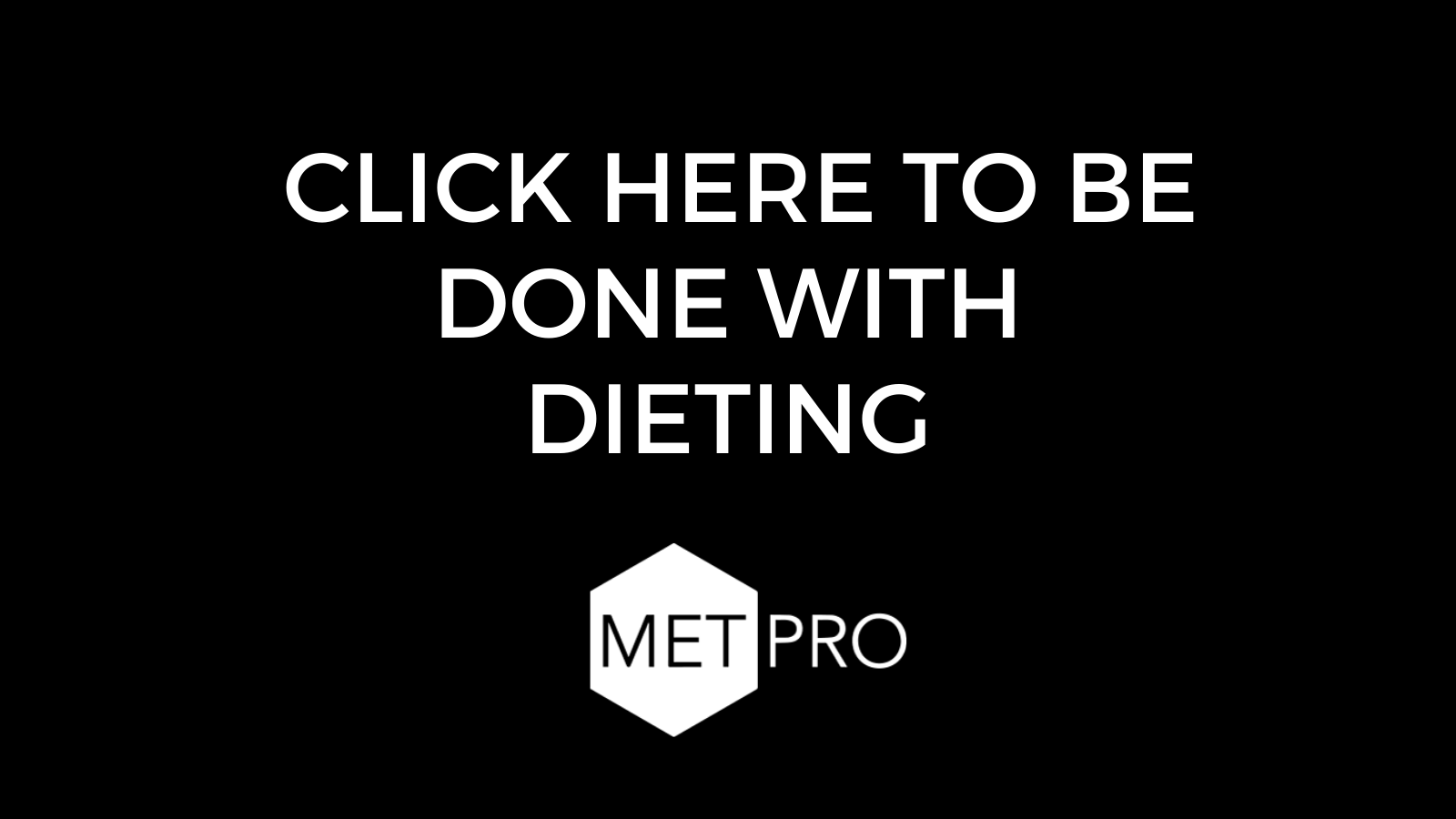Crystal O’Keefe: Welcome to the MetPro Method podcast. I’m your host, Crystal O’Keefe, and today I am joined by MetPro Coach Ryan McMullen, and we are going to be discussing weight loss strategies Thus far, we’ve had two other episodes.
We talked about losing 50 plus pounds, and we’ve also talked about what do you need to do for strategies for those last 10 pounds. And Ryan, you’re here to join us today also to talk about, now we’re in maintenance phase.
Thank you so much for being here.
Ryan McMullen: Thanks for having me.
Crystal O’Keefe: Well, I’m excited to talk about this.
Someday I will be in the maintenance phase where I’m happy with where I am, and I want to know, how do you start once you’re there?
Ryan McMullen: This is the, I probably said this in the last podcast, but now that I’m thinking about it, this is probably the scariest phase.
Crystal O’Keefe: Is that because the training wheels come off and you’re just like, here we go.
Ryan McMullen: Um, in, in my experience both personally and with clients is when we reach weight maintenance, uh, a lot of liberties start being taken with diet and training.
Crystal O’Keefe: You know what, you know, what you mentioned in your experience that I forgot to ask you this. Tell us about your experience as we dive into this. Sorry.
Ryan McMullen: So my experience, I grew up really overweight. My heaviest was about 280, I think. And overall I lost about 90 pounds, got down to around 190. I then have been just everywhere between, I mean, building back up and gaining muscle and weight, and then losing weight again, and then gaining and losing.
So, a lot of areas in between. Uh, so weight maintenance is very interesting to me and difficult too. I like, even for me, it’s, it’s very, very challenging to just. Maintain my weight. So this is a, it’s an interesting one for maintenance.
Crystal O’Keefe: What goes through your head? Like, I sense a little anxiety when you think about like, okay, I’m ready to maintain.
Do you, do you get a little, little anxious?
Ryan McMullen: A little bit, yeah. Because it, it really depends on, there’s that word again, it depends on the goal, what you’re doing, right. At least in my journey, and hopefully this helps other people, right?
It may be more helpful when I have a triathlon or a half marathon or you know, maybe a lot more body weight type stuff that should require me to be at a lighter weight, right? That like I do need to be a lot leaner to perform better at those types of activities, versus if I’m training for a weightlifting competition, you know, the snatch and the clean and jerk, or a power lifting competition. I may want to be a little bit heavier and put on more muscle and gain back up.
So like, to be perfectly honest, weight maintenance has not been a super big part of my vocabulary. Okay. At least personally. So, and it’s really, really hard. It like, it really is hard to maintain weight, especially if you’re a person that changes your goals around from time to time.
Crystal O’Keefe: Yeah. So, if you change your goals, then maybe how weight and maintenance occurs needs to look a little bit different.
Like, does that mean you need to eat different foods? Does that mean you might be doing different workouts? Like, what does that mean?
Ryan McMullen: Both. Absolutely. So, if I’m, you know, building a lot of muscle and training for, you know, uh, Olympic weightlifting competition, then yeah, my eating and my training are going to change dramatically.
Right. I’m likely doing a lot less cardio and I’m likely, you know, not even going on runs and I’m likely not even doing like, short hit interval work for the most part. You know, it’s primarily like, Low rep, very high weight squats, deadlifts, snatches, cleaning jerks, benching, like you name it, right? So, the training changes pretty dramatically, and so does the diet.
I’m eating a lot more, and specifically carbs, proteins to help me fuel for the next day, right? I’m trying to recover, well, I’m trying to rebuild muscle tissue so that diet and the training look. Vastly different versus if I am cutting or I am trying to get down to a weight for, I want to run a half marathon.
Totally different, right? I might be. You know, eating moderate amount of carbohydrates, but significantly less than if I was strength training and using intra-exercise fuel, you know, like GU’s and gels and chews and things like that, right? But my day-to-day might be significantly lower because I’m trying to get my weight down and then my training obviously changes.
I might now be doing two days a week of strength training and running for, or five days a week. And it’s, it’s completely different. And, and, and that’s not really maintenance, right? Right. It’s, that’s it, it’s almost a completely different conversation where you’re, you’re just identifying what is the goal and then trying to match both your diet and your training with that goal.
Crystal O’Keefe: Okay. What about the person, and I realize this may not be something that you’ve done. But what about the person who’s started this journey with 50 plus pounds to lose. Then they got down, they went through that 10 pounds, they finally got to the number and they liked the way they looked in the mirror.
If I’m that person, can I just eat the same foods I’ve been eating and just stay there? Nothing changes. I just do this.
Ryan McMullen: I wish that was the case. That would be so easy. Right? And you and I would be out of a job. Um, no, it’s challenging because there’s, there’s two things happening.
So, one, no matter what, even if you don’t change anything, like your diet is the same, your training is the same. What we know is your metabolism can change over time for so many different reasons, right? Maybe your life is really stressful, you got a new job and your hours changed. Or maybe you just had a kid, and you have a baby in the household, and sleep goes, you know, completely down the drain.
You know, for you parents out there, right? You’re sleeping four or five hours a night because you have a little one to take care of, or you move or there’s so many other life events that can cause. Stress cause cortisol increases, because I mean so many different things. So metabolism can both speed up and slowdown in that sense.
So, weight maintenance is, is hard because if you’re just eating the same thing every single day, that might work for a period of time. And then you go through this, you know, life event or this change or these increased stressors and all of a sudden, your metabolism slows down dramatically. And you start gaining weight and internally you’re going.
What did I do? What did, like I’m eating the same thing. I’m working out daily, doing the exact same thing for six months. I was able to maintain this weight and now all of a sudden, the scale is starting to creep up. Why? Right. And that’s where we have to shift. And that really is the hardest part because people get into maintenance mode and all of a sudden, it’s like, do I go up in my intake?
Do I go down? Like, what is my body really doing? And that’s difficult. It’s really stressful and it’s hard. So that’s one thing that can happen with weight maintenance. The other is starting to take too many liberties, and this is where things creep up a little bit, right? So, you know, we’re at a happy weight.
We’re happy with how we look in the mirror. Now, we go away for a weekend and we’re like, you know what, I’m going to indulge, I’m going to have the few drinks. I’m going to have this meal when I eat out and we come back from, you know, vacation or a weekend away and the scale is a couple pounds up.
Right? Yep. Then you go back to eating the way you were before, and it doesn’t come off. Uhoh Uhoh, right? And most people, and I’ve experienced this myself and I’ve seen it, is we kind of just shrug the shoulders and say, well, it’s only a few pounds. That’s okay. I still feel good. I still feel like I look good.
I’m fine. Right? Mm-hmm. And then that trickles on for a month. You gained a couple pounds, but now you’re staying there. And then it happens again, and then it happens again, and it’s a really slow process. But now, before you know it, a year goes by, or two years go by and you look back and you go, wait a second.
I was 20 pounds less than this two years ago or a year ago. How did that weight come back on? What happened, like I’ve been relatively good about my diet other than these minor indulgences here and there. And that’s where things get really, really hard is it creeps up on you slow but fast in the long run.
Yeah. So if you look and you’re like, what the heck happened? And that’s the scary thing. So weight maintenance, if you are happy, don’t take that. What I would say is if, if you truly want to be that weight and you want to maintain there, don’t be okay. With a couple pounds here and there, because before you know it, a long time goes by and you’ve gained a bunch of weight back that you didn’t want.
And it’s going to be super tough getting it back off.
Crystal O’Keefe: But you can’t just be like, okay, well now I’m just going to not eat some food and lose the weight, because then that causes a whole set, another set of problems, right? So what do we do?
Ryan McMullen: Yeah, and that’s when, yeah, metabolism slows down, right? So we do this overcorrection, right?
So it’s kind of driving done. Then you go to like switch lanes and you turn around and you know your wheel shifts a little bit and you freak out and you come back, right? So we’re overcorrecting and then people. You know, they go into a little bit of starvation mode. They undereat and then their metabolism slows down, but their weight falls off and then they go back to eating more.
And because it’s more, their weight starts to gain. And I tell, I don’t know about you, but I tell my clients this all the time. I can’t even navigate my diet and my metabolism myself. I don’t like to, it’s too much of a headache. I would prefer someone else do it and give me that third point of view to say, well, X, Y, and Z is why your weight is up and it’s not falling off, or it fell off and here are.
Seven reasons why it came back on. You need to do this to fix it. And that’s where I really encourage people is like, get a coach. Get someone that has no biased opinion, is just going to tell you like, here’s the science, here’s the facts, here’s what you did and here’s why it’s happening. And that’s what we do.
I, again, I don’t even do this myself. I have conversations all the time with my girlfriend. It’s like, man, my weight is not coming off. And she’s like, well, you did this, this, and this, and you’re inflamed because you’re sore and you’ve been drinking a ton of water and we had a salty meal last night.
Right? So even she is listening to me and going, you have no reason to be frustrated. Here’s why. Yeah.
Crystal O’Keefe: Yeah. It’s so funny. That sounds like a conversation at our house. Like, oh, why did the weight go up today? Well, you did have that big weight workout yesterday.
Yeah. Oh yeah. It wasn’t just that I ate.
Oh, okay. That’s, that’s really good advice. So is there anything else that you feel like people should know about weight maintenance, uh, that we haven’t covered yet?
Ryan McMullen: Yeah, I, I think we covered it, but just again, to reiterate, don’t expect that you can just eat the same thing day in and day out for months or years, you know?
And everyone is different. You may be able to eat the same for three years and maintain your weight, right. Other people may only go three months and all of a sudden something starts happening and that’s. Both the beauty and the downfall of metabolism, right, is because it can change really, really rapidly or very slowly and it can either creep up on you or hit you like a train.
So just be aware of these things going on and be in tune with your body and ask yourself those questions because it can, it can go a lot of different ways.
Crystal O’Keefe: That is very good advice. Well, uh, Ryan, thank you so much for your time today and for teaching us all about weight loss strategies. Across the spectrum.
I appreciate it. And listeners, that’s all for this week. Be sure to listen to the other two parts of this series. Strategies for Losing 50 plus Pounds, and Strategies for Losing that Last 10 Pounds. You can also find all the rest of the MetPro Method episodes anywhere you get podcasts, or you can go to MetPro.co/podcasts.
Please be sure to follow and rate the show that lets other people know what to expect. And you can learn more about MetPro at metpro.co. I am your host, Crystal O’Keefe, and I’ll be back next week. Until then, remember, consistency is key.






